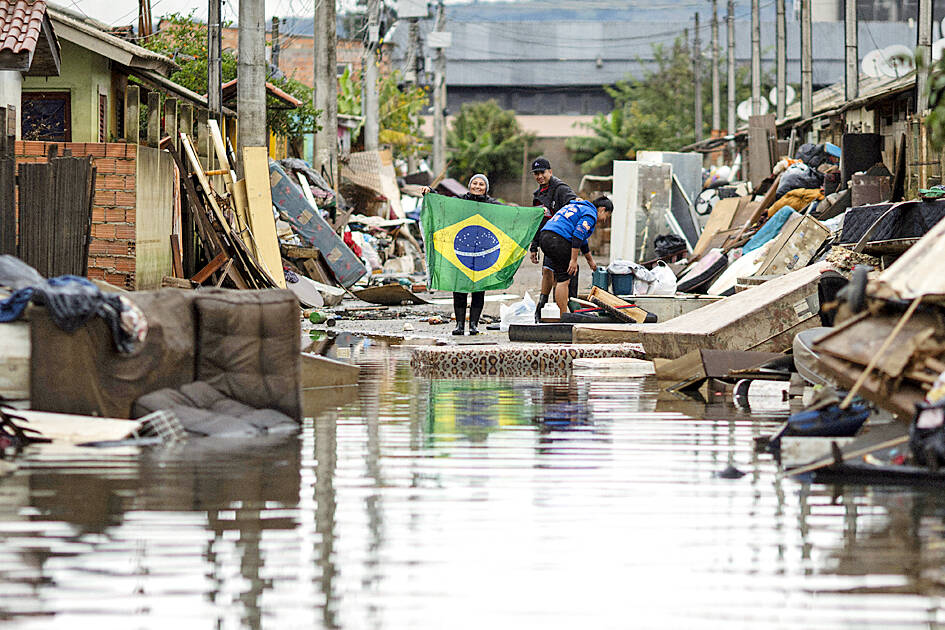Climate change doubled the likelihood of the historic floods in southern Brazil and amplified intense rains caused by the El Nino weather phenomenon, scientists said on Monday.
Three months’ worth of rain was dumped on the southern state of Rio Grande do Sul over two weeks in an “extremely rare event, expected to occur only once every 100 to 250 years,” according to a study published by the World Weather Attribution (WWA) group.
The flooding in late April and early last month submerged cities, farms and an international airport, affecting more than 90 percent of the vast state, an area equivalent to that of the UK.

Photo: EPA-EFE
The disaster left 172 people dead and displaced about 600,000.
“The researchers estimated that climate change made the event more than twice as likely and around six to nine percent more intense,” the WWA said in a statement.
On top of that, the El Nino phenomenon made rainfall between three and 10 percent more intense, said the global network of scientists that assesses the link between extreme weather events and climate change.
“The scary thing about these floods is that they show us that the world needs to be prepared for events so extreme, they are unlike anything we’ve seen before,” said Maja Vahlberg, climate risk consultant at the Red Cross Red Crescent Climate Centre.
Regina Rodrigues, a researcher at the Federal University of Santa Catarina, said the disaster showed that even when El Nino was in a weakening phase, as it currently is, it could be extremely dangerous.
“Climate change is amplifying the impact of El Nino in southern Brazil by making an extremely rare event more frequent and intense,” she said.
Of the four biggest floods ever seen in the regional capital Porto Alegre, “three occurred in the last nine months,” Rodrigues told a news conference. “This is very rare.”
Rio Grande do Sul is particularly vulnerable to flooding, with a vein-like network of river systems covering the region.
However, until last year the city had not seen a major flood in six decades.
This might have lulled residents into a false sense of security, Vahlberg said.
A flood protection system in Porto Alegre, built after deluges in 1941 and 1967, was designed to withstand water levels up to 6m, but Vahlberg said a lack of maintenance saw it start to fail at 4.5m.
Criticized by residents as ugly and blocking their view of a lake, the system faced a push to have it dismantled entirely.
Warnings had been issued a week before the flooding, but these might not have reached everyone and “the public may not have understood the severity of the expected impact,” Vahlberg said.
The scientists said deforestation, to make way for agriculture, and the rapid urbanization of cities like Porto Alegre also “worsened the impacts.”

FRAUD ALLEGED: The leader of an opposition alliance made allegations of electoral irregularities and called for a protest in Tirana as European leaders are to meet Albanian Prime Minister Edi Rama’s Socialist Party scored a large victory in parliamentary elections, securing him his fourth term, official results showed late on Tuesday. The Socialist Party won 52.1 percent of the vote on Sunday compared with 34.2 percent for an alliance of opposition parties led by his main rival Sali Berisha, according to results released by the Albanian Central Election Commission. Diaspora votes have yet to be counted, but according to initial results, Rama was also leading there. According to projections, the Socialist Party could have more lawmakers than in 2021 elections. At the time, it won 74 seats in the

A Croatian town has come up with a novel solution to solve the issue of working parents when there are no public childcare spaces available: pay grandparents to do it. Samobor, near the capital, Zagreb, has become the first in the country to run a “Grandmother-Grandfather Service,” which pays 360 euros (US$400) a month per child. The scheme allows grandparents to top up their pension, but the authorities also hope it will boost family ties and tackle social isolation as the population ages. “The benefits are multiple,” Samobor Mayor Petra Skrobot told reporters. “Pensions are rather low and for parents it is sometimes

CONTROVERSY: During the performance of Israel’s entrant Yuval Raphael’s song ‘New Day Will Rise,’ loud whistles were heard and two people tried to get on stage Austria’s JJ yesterday won the Eurovision Song Contest, with his operatic song Wasted Love triumphing at the world’s biggest live music television event. After votes from national juries around Europe and viewers from across the continent and beyond, JJ gave Austria its first victory since bearded drag performer Conchita Wurst’s 2014 triumph. After the nail-biting drama as the votes were revealed running into yesterday morning, Austria finished with 436 points, ahead of Israel — whose participation drew protests — on 357 and Estonia on 356. “Thank you to you, Europe, for making my dreams come true,” 24-year-old countertenor JJ, whose

BACKLASH: The National Party quit its decades-long partnership with the Liberal Party after their election loss to center-left Labor, which won a historic third term Australia’s National Party has split from its conservative coalition partner of more than 60 years, the Liberal Party, citing policy differences over renewable energy and after a resounding loss at a national election this month. “Its time to have a break,” Nationals leader David Littleproud told reporters yesterday. The split shows the pressure on Australia’s conservative parties after Prime Minister Anthony Albanese’s center-left Labor party won a historic second term in the May 3 election, powered by a voter backlash against US President Donald Trump’s policies. Under the long-standing partnership in state and federal politics, the Liberal and National coalition had shared power